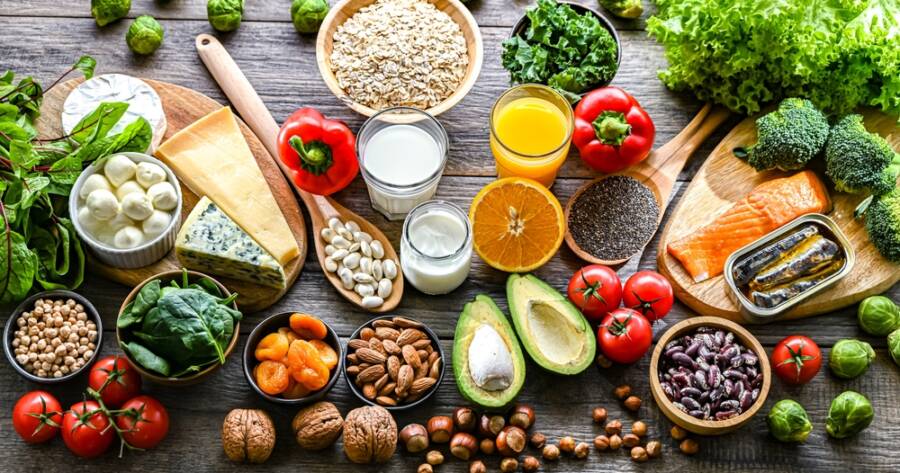Strong bones are the foundation of a healthy, active life. While calcium and vitamin D are well-known nutrients that support bone density, many foods play a role in maintaining skeletal strength and resilience. A well-balanced diet can help prevent bone loss, reduce the risk of fractures, and support mobility as you age. Smart food choices now can make a lasting difference in your long-term health.
Dairy Products: A Classic Source of Bone-Building Nutrients
Dairy products remain one of the most reliable sources of calcium, a key mineral for bone strength. Milk, yogurt, and cheese offer not only high calcium content but also contain protein and phosphorus, which help your body make the most of this vital nutrient. Many dairy products are also fortified with vitamin D, which supports calcium absorption.
For those who are lactose intolerant or prefer non-dairy options, many plant-based milks—such as almond, soy, or oat—are fortified with both calcium and vitamin D. Greek yogurt is a popular choice because of its added protein, which is another essential for building strong bones. Including dairy or fortified alternatives regularly can go a long way in keeping your bones healthy.
Leafy Greens and Cruciferous Vegetables
Dark leafy greens like kale, collard greens, and bok choy are nutrient-rich powerhouses when it comes to bone support. These vegetables provide calcium, vitamin K, magnesium, and other bone-friendly nutrients. Vitamin K is especially important as it plays a role in bone metabolism and maintaining bone density.
Cruciferous vegetables like broccoli and Brussels sprouts also offer beneficial plant compounds that support bone health. They’re low in calories but high in vitamins and minerals, making them excellent choices for any meal. Try sautéing spinach with garlic or adding chopped kale to soups and stews. Consuming a variety of these vegetables throughout the week can help keep your skeleton strong and resilient.
Fatty Fish and Seafood for Vitamin D and Omega-3s
Fatty fish such as salmon, sardines, and mackerel are rich in vitamin D and omega-3 fatty acids, both of which play a role in bone health. Vitamin D helps your body absorb calcium effectively, while omega-3s may help reduce inflammation that can affect bone breakdown. Including fish in your diet a couple of times a week provides a flavorful way to support bone strength.
Some fish, like canned salmon or sardines, also include edible bones that are a natural source of calcium. For those who prefer plant-based sources, flaxseeds and chia seeds offer some omega-3s, though they don’t supply vitamin D. If seafood isn’t your go-to, look for vitamin D-fortified foods or spend time in natural sunlight, which also supports your body’s production of the vitamin.
Nuts, Seeds, and Legumes
Nuts and seeds are small but mighty when it comes to bone nutrition. Almonds, chia seeds, and sesame seeds contain calcium, magnesium, and phosphorus—nutrients that all contribute to healthy bones. Walnuts are particularly rich in omega-3 fatty acids, which can offer anti-inflammatory benefits that may support long-term bone health.
Legumes like lentils, chickpeas, and black beans provide plant-based protein, magnesium, and other minerals that aid bone repair and growth. They’re also high in fiber, making them great for digestive health as well. Incorporate nuts as a snack or use beans in soups, salads, or side dishes. Regularly including a mix of these foods adds nutrient diversity to your meals and supports your bones from multiple angles.
Whole Grains and Fortified Foods
Whole grains such as brown rice, quinoa, and oats provide more than just energy—they also offer magnesium, zinc, and fiber, all of which contribute to bone maintenance. Magnesium helps activate vitamin D, which is essential for calcium absorption, while zinc supports the growth and renewal of bone tissue.
Many cereals and breads are fortified with essential nutrients like calcium and vitamin D, especially helpful for those who may not consume enough through traditional sources. Always check food labels to ensure you’re getting added nutritional value. Fortified foods can be a smart addition to your routine, particularly when combined with other whole food sources, to ensure your bones stay nourished and strong.
Building Bone Health One Bite at a Time
Bone strength doesn’t rely on a single food or supplement—it’s built over time through consistent, balanced nutrition. A varied diet rich in calcium, vitamin D, magnesium, and protein is one of the most effective ways to support lifelong bone health.
While food should always be the primary source of nutrients, supplements may be helpful in some cases. Always consult with your healthcare provider before adding supplements to your routine to ensure they align with your needs. Making intentional choices today can help protect your mobility and quality of life in the years to come.
